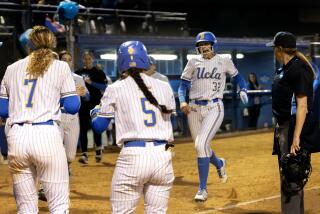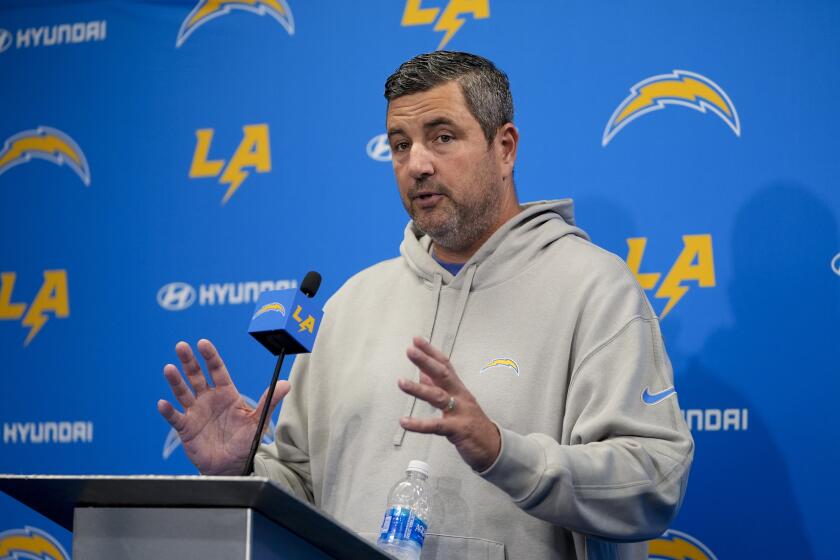Ex-Guild Boss Under Scrutiny
While a House subcommittee suggested that he might face contempt of Congress charges for ignoring congressional subpoenas, L. Wayne Gertmenian was accused Thursday by the Jockeys’ Guild of improperly writing checks totaling $217,000.
Problems continued to mushroom for Gertmenian, the Pepperdine University economics professor who was dislodged as president of the guild in an emergency meeting by a new board of directors Tuesday.
The guild, which represents about 1,300 of the 1,800 jockeys in the U.S., was left without accident-insurance coverage for its members when Gertmenian allowed a $1-million policy to lapse in 2002.
Shane Gusman, a guild attorney from Sacramento, said that on Tuesday, the same day he was fired, Gertmenian issued at least four checks -- to himself, an associate and the consulting company that Gertmenian owns.
Gusman said that was a criminal violation of guild rules -- put into effect two weeks ago -- that prohibited the writing of checks for more than $200 without permission of Jeff Johnston, the organization’s treasurer.
Gertmenian “knew these regulations were in place, but he went ahead, anyway,” Johnston said.
Johnston also said that the checks of several permanently disabled jockeys had bounced in recent weeks but that restitution had been made.
In a letter published Sunday by the Daily Racing Form, 25 of the disabled riders said that Gertmenian couldn’t be trusted and called for the reappointment of John Giovanni as national manager. Giovanni, a former jockey, was thrown out when jockey Chris McCarron, then a friend of the Pepperdine professor, hand-picked Gertmenian to replace Giovanni. McCarron has distanced himself from Gertmenian as the guild’s problems multiplied.
Gusman said that Monrovia police and Bank of America were conducting an investigation into the checks. Gertmenian, who took over guild leadership in 2001, and Matrix Capital Associates, his consulting firm, were being paid about $500,000 a year by the guild, but Gusman said that Tuesday’s checks were not payroll drafts.
Neither Gertmenian nor Albert Fiss, the guild vice president who was also fired, returned phone calls. Pepperdine officials couldn’t be reached for comment about Gertmenian.
A second congressional hearing in Washington, chaired by Rep. Edward Whitfield (R-Ky.), spent the afternoon focusing on jockeys’ insurance problems and occasionally homed in on Gertmenian’s role with the guild.
Gertmenian “has not responded to our subpoenas,” Whitfield said. “We may take up contempt charges against him and Matrix.”
Gertmenian testified at the subcommittee’s first hearing, last month, when the panel accused him of fabricating his credentials and milking a cash-strapped organization. In his resume on a Pepperdine website, Gertmenian says that he was the “chief detente negotiator” in Moscow for the National Security Council during the President Nixon and Ford administrations.
“We’ve heard from Henry Kissinger, and he said he never heard of this man,” said Rep. Joe L. Barton (R-Texas). “When [Gertmenian testified], he set a new standard for disingenuous and fraudulent statements.”
Gertmenian and Fiss, who is about 6 feet 4 and weighs more than 300 pounds, allegedly got into a scuffle with some jockeys and guild officials at the guild offices in Monrovia on Tuesday.
Gusman said Gertmenian “got physical” with Darrell Haire, a retired jockey who had been named temporary national manager of the guild hours before. Police were called, but there were no arrests or charges filed.
“Now the riders have control of their own organization again,” Haire told the subcommittee. “It’s been a real mess. But we’re going to get our arms around it and turn it around.”
Chris Scherf, executive vice president of the Thoroughbred Racing Assns., a trade group that represents most of the country’s major tracks, testified that the guild, under Giovanni, bought a $1-million catastrophic-accident insurance policy for a $440,000 premium in 2001.
For years, Scherf said, the TRA, in exchange for the jockeys waiving their media rights, had paid the guild a flat annual sum that was to be used to defray insurance costs. Unlike athletes in team sports, jockeys do not share in TV revenue and waiving of media rights basically amounts to not charging the tracks to ride in televised races.
That TRA payment, which had reached $2.2 million a year, was discontinued, Scherf said, because the tracks could not be sure where the money was going.
“We wouldn’t be here today,” Scherf said, “if [Gertmenian] hadn’t used the $2.2 million for other purposes. Accident insurance [under Gertmenian] was no longer a guild priority. The disabled-jockeys fund ran out of money. It was a ploy [by Gertmenian] to create a crisis in the industry” that supposedly would lead to improved national insurance coverage.
More to Read
Get our high school sports newsletter
Prep Rally is devoted to the SoCal high school sports experience, bringing you scores, stories and a behind-the-scenes look at what makes prep sports so popular.
You may occasionally receive promotional content from the Los Angeles Times.






